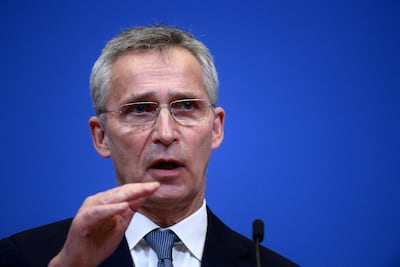A Russian invasion of Ukraine will backfire because it will only harden the Nato presence in Eastern Europe that Moscow so dislikes, the head of the alliance said.
Nato Secretary General Jens Stoltenberg said the alliance was ready to step up its presence in the former eastern bloc to “prevent any misunderstanding” about its readiness to defend its territory.
But although Nato will help Ukraine, which is not a member of the alliance, to prepare for possible attacks, there are no plans to send combat troops there if Russia invades, he said.
Nato deployments in the former Soviet sphere of influence are viewed with deep suspicion in Moscow, which has sought to use the crisis in Ukraine to press for limits on the alliance’s expansion.
But Mr Stoltenberg said Russia's problems were self-inflicted because of its 2014 annexation of Crimea and continued fears that it plans to invade Ukraine.
“If Russia wants less Nato at its borders, they have actually achieved exactly the opposite,” Mr Stoltenberg told the Atlantic Council think tank.
“And if they use force again against Ukraine, they will achieve even more Nato at their borders.”
Amid a build-up of more than 100,000 Russian troops on Ukraine’s eastern flank, Mr Stoltenberg said Nato was on alert for various forms of aggression – from sabotage efforts or support for a coup to an all-out invasion.
He said the build-up was continuing with heavy armour, aircraft and missiles potentially available to attack Ukraine, while Russian troops simultaneously make manoeuvres in Belarus, an ally of Moscow.
Nato and Washington have said they do not know what Russia’s intentions are, or whether the Kremlin itself has decided on whether to invade.
While there is no consensus among Nato allies on how much military support to provide to Ukraine, Mr Stoltenberg said there was unity on providing a firm deterrent to Russia in the alliance’s member states.
Germany, which has held out against providing weapons to Ukraine, is leading a battlegroup of Nato personnel in Lithuania, which is part of the alliance.
Mr Stoltenberg suggested that a potential greater Nato presence in eastern Europe was part of the heavy price that Russia has repeatedly been told it would pay for an invasion.
This could also include economic sanctions being prepared by Europe and the US, potentially involving direct measures against Russian President Vladimir Putin.

But Nato allies “are, at the same time, pursuing the diplomatic track, because the best solution would be to prevent any intervention into Ukraine”, Mr Stoltenberg said.
Moscow insists it has no plans to invade, and said on Friday that it was open to further talks with the US on Russian proposals to limit Nato expansion.
A Nato response to these proposals went down badly in Moscow, with Foreign Minister Sergey Lavrov saying he felt embarrassed for the authors.
Nato’s suggestions, as described by Mr Stoltenberg, include extra lines of communication with Moscow.
But Mr Lavrov signalled there was more scope for discussion on a separate response by the US. He expects to speak to US Secretary of State Antony Blinken in the next two weeks, after they met in Geneva last week.
Meanwhile, US President Joe Biden on Friday sought to maintain pressure on Mr Putin by announcing a small troop deployment to eastern Europe.
As President Volodymyr Zelenskiy urged western leaders to avoid stirring "panic" over the Russian troop build-up on his country's borders, Mr Putin and French President Emmanuel Macron agreed on the need for de-escalation.
In Washington, Mr Biden nevertheless said he would soon send a small number of US troops to bolster the Nato presence in Eastern Europe as tensions remain heightened.
At the Pentagon, officials urged a focus on diplomacy while saying that Russia now had enough troops and equipment in place to threaten the whole of Ukraine.
Any such conflict, said US general and Joint Chiefs Chairman Mark Milley, would be "horrific" for both sides.
























